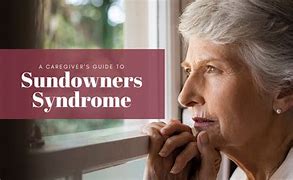10 Tips To Manage Sundowning In Seniors With Alzheimer’s. If you are looking for ways to help your loved one with Alzheimer’s experience sundowning, these tips may help. It includes the common signs and symptoms and the possible causes.

Sundowning refers to the increased confusion in Alzheimer’s patients in late-day or evening hours. It can happen at any point during the day but most often during dusk or after dark when shadows are long, and nocturnal animals are active. Sundowning can become a recurring situation in the daily care of an Alzheimer’s elder. There are many triggers that may cause sundowning behavior. In general, they are linked to changes in light, increased stimulation and activity, and emotional factors like loneliness, fear, or depression.
Seeing your loved one suffer from sundowning can be painful and frightening. They may not recognize you, become violent or try to leave the house at low light levels. They may also wander around your house. Although there are no guaranteed ways and strategies to prevent sundowning, it is possible to reduce the risk. You can take effective steps to help manage this challenging time of day, so you both sleep well and are less weary during the day.
Knowing the symptoms and causes of sundowning will help you know what to expect when it happens. Once you know the cause of sundowning, you can take steps to avoid it and ease the symptoms.
Common Symptoms of Sundowners Syndrome
Sundowners syndrome is a disorder that affects the cognitive ability of an older adult. Individuals with this condition may become confused by abrupt changes in light and their emotions. The main symptoms include:
- Confusion with time and place
- Elevated frustration
- Anxiety and anger when being disturbed
- Lack of awareness about things around them
- Depression at night
- Demanding
- Suspicious
Seniors who suffer from Sundowners syndrome may also
- Yell
- Cry
- Hesitate when requested to do something
- Avoid eye contact
- Attempt to leave the room
- Have a tendency to wander from a familiar place
Possible Causes of Sundowners Syndrome
Doctors have not found the precise cause of sundowning. One possibility is that Alzheimer’s-related brain changes can affect your loved one’s biological clock, leading to confused sleep-wake cycles. This may result in agitation and other related sundowning behaviors.
Other possible causes of Sundowners syndrome include:
- Being overly tired
- Pain
- Depression
- Boredom
- Unmet needs such as hunger or thirst
What Triggers Sundowners Syndrome?
Those who are not aware of these triggers run the risk of sundowning.
1. Fluctuations in light. It is one of the major factors causing the onset of sundowners syndrome. The person with dementia may have a difficult time adjusting to gradual changes in lighting, such as coming from a bright room into a dimly lit one or vice versa. When this happens, try giving your loved one some warning. It will help to prevent confusion and sundowning behavior.
2. Loud noises or sudden disturbances can also trigger an episode of sundowners syndrome. Try to avoid unnecessary disturbances such as loud music or TV, sudden unexpected visitors, or arguments between family members in front of your loved one with Alzheimer’s disease, etc.
3. Another factor is the weather. When the sun goes down, and sunlight darkness takes over, it becomes harder for someone with Alzheimer’s to adapt to his environment. It may cause agitation and causes sundowning behavior. Try to avoid loud noise, noisome odors, and sudden temperature changes.
Understanding the possible causes and risks of Sundowners Syndrome can help you prevent the occurrence of this challenging behavior.
10 Tips To Manage Sundowning In Seniors with Alzheimer’s
Seniors who experience sundowning should be given careful attention and care to avoid upsetting them and causing undue stress. Here are ten valuable tips that can help you give your senior loved one with Alzheimer’s some rest and quiet time. Some of these means may not be possible for you, but these actions will help sustain and improve your relationship with your loved one.
1. Keep a Daily Routine
Set regular times for meal preparation and showering. Also, plan your day’s activities, take your loved one around the house and do some simple daily chores like laundry and watering plants. Try to schedule their appointments, times when you need to be away from home, or important commitments. Knowing what is coming up can help them feel secure and better prepared.
2. Simplify Surroundings
Make sure your loved one has only the essentials in their rooms. Get rid of unnecessary items, knickknacks, decorations, furniture, and clutter from their room so the environment is relatively free from stressors that may cause confusion. It will reduce their anxiety level and allow them to focus on more important things like caring for themselves, playing with a pet, or having time for a hobby. Remove pictures of people that are not immediate family members and pictures of strangers.
3. Keep Your Loved One Busy
Get your loved one involved in some simple hobbies. Artwork is a good choice. Crafts can be great for this activity, but check the safety and health issues before giving your loved one anything that requires a lot of time and concentration. Check if their medications are needed or if there is a need for additional care with their health condition before starting new activities.
4. Keep Things Quiet
Keep outside noises to a minimum when possible or distract your loved one with music, television, or other hobbies or interests that do not require much concentration or mental effort, such as computer games. If you can’t avoid being disturbed during the day, try to make the disturbance as minimal as possible by avoiding large groups of people and loud noises.
5. Keep Dinner Light
Don’t give your loved one a heavy or rich meal at the end of the day. Keep it light and simple. It will avoid the risk of them feeling uncomfortably full or bloated, which may worsen their sundowning symptoms.
6. Eliminate Naps or Take Shorter Naps
If your loved one is awake throughout the night, he will be tired throughout the day. Naps may become necessary, but try to keep naps as short as possible, perhaps a half-hour or an hour.
7. Limit Caffeine and Sugar Intake
Caffeine from coffee, tea, cola, and other soft drinks may cause your loved one with Alzheimer’s to experience a rapid heartbeat, mood swings, and other physical symptoms of agitation. Alcohol also contains caffeine and should be avoided at all times because it can have other side effects. Sugary snacks increase the risk of infections when your loved one is on antibiotics. If necessary, encourage your loved one to have a snack containing protein or high-fiber carbohydrates that are less likely to cause changes in blood sugar levels.
8. Limit Strenuous Activity Before Bedtime
Strenuous physical activity should be limited, such as playing with a pet or doing home repair projects. Do not overexert your loved one, and do not do any exercise that requires walking for long periods. It can cause dehydration and make them dizzy, leading to falls.
9. Declutter
Clean out their closets, drawers, and cabinets, which can get into the way of daily activities like dressing and grooming. A cluttered bedroom makes it harder for your loved ones to keep track of things they need in the morning, especially if they are forgetful or disoriented in the morning. Shutting off the TV and radio and taking down the shades at night may reduce lighting noise, but always make sure they are safe first.
10. Focus On Safety
Make sure your loved one’s home is safe to go in, especially their bathroom and bed. Put locks on doors and place drop cords or hooks throughout the house to help prevent falls. Ensure you know where all the handles, windows, doorknobs, and other escape options are in your home, so if you can’t follow them back to ensure they go to a safe place, they will not get hurt or trapped in a dangerous area. Have someone check on them regularly to ensure they are safe.
Conclusion
Older adults who experience sundowning should be given careful attention and care to avoid upsetting them and causing undue stress. Try to implement these tips to help your loved one live a more enjoyable life and avoid triggering behaviors. Remember, it will become more difficult for you to handle sundowning episodes as the disease progresses. It is when professional help is needed. If your loved one becomes aggressive at night, seek help from a care provider who can help you manage this behavior. It may also take its toll on you mentally and physically, so be sure to also take good care of yourself and talk with someone if you’re having difficulty coping with your situation.
Author Bio
Andrea Gibbs is the Content Manager at SpringHive Web Agency, a company that offers web design services, maintenance, and Internet marketing. She specializes in content marketing, social media, and SEO. She also serves as a blog contributor at Serenity Senior Care. She’s an avid personal development enthusiast and an expert in the field of health and fitness. When she’s not writing she can be found running hills or hiking trails, rooting for her favorite team (the Pittsburgh Steelers), or watching a good Netflix series.






